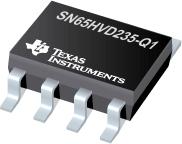Part Datasheet Search > TI > SN65HVD235-Q1 Datasheet PDF

 Part 3D Model
Part 3D Model$ 0
SN65HVD235-Q1 Datasheet PDF - TI
Manufacturer:
TI
Description:
3.3V Automotive CAN Bus Transceivers
Pictures:
3D Model
Symbol
Footprint
Pinout
Product Pictures
SN65HVD235-Q1 Datasheet PDF
AiEMA has not yet included the datasheet for SN65HVD235-Q1
If necessary, please send a supplementary document request to the administrator

SN65HVD235-Q1 Datasheet PDF (35 Pages)
SN65HVD235-Q1 Environmental
SN65HVD235-Q1 Function Overview
●The SN65HVD233-Q1, SN65HVD234-Q1, and SN65HVD235-Q1 devices are fault-protected 3.3-V CAN transceivers that are qualified for use in automotive applications. These transceivers work from a 3.3-V supply and are ideal for systems that also leverage a 3.3-V microcontroller, thereby reducing the need for additional components or a separate supply to power the controller and the CAN transceiver. The SN65HVD23x-Q1 transceivers are compatible with the ISO 11898-2 standard and thus are interoperable in mixed networks that employ 5-V CAN and/or 3.3-V CAN transceivers.
●Designed for operation in especially harsh environments, the devices feature crosswire protection, overvoltage protection on the CANH and CANL pins up to ±36 V, loss-of-ground protection, overtemperature (thermal shutdown) protection, and common-mode transient protection of ±100 V. These devices operate over a wide –7-V to 12-V common-mode range. These transceivers are the interface between the host CAN controller on the microprocessor and the differential CAN bus used in transportation and automotive applications.
●Modes:
● The RS pin (pin 8) of the SN65HVD233-Q1, SN65HVD234-Q1, and SN65HVD235-Q1 devices provides three modes of operation: high-speed, slope control, and low-power standby mode. The high-speed mode of operation is selected by connecting pin 8 directly to ground, allowing the driver output transistors to switch on and off as fast as possible with no limitation on the rise and fall slope. The rise and fall slope can be adjusted by connecting a resistor between the RS pin and ground. The slope is proportional to the output current of the pin. With a resistor value of 10 kΩ the device driver has a slew rate of approximately 15 V/µs, and with a value of 100 kΩ the device has a slew rate of approximately 2 V/µs. For more information about slope control, see _Feature Description_.
●The SN65HVD233-Q1, SN65HVD234-Q1, and SN65HVD235-Q1 devices enter a low-current standby (listen-only) mode during which the driver is switched off and the receiver remains active if a high logic level is applied to the RS pin. If the local protocol controller must transmit a message to the bus, it must return also the device to either high-speed mode or slope-control mode via the RS pin.
●Loopback (SN65HVD233-Q1):
● A logic high on the loopback (LBK) pin (pin 5) of the SN65HVD233-Q1 device places the bus output and bus input in a high-impedance state. Internally, the TXD-to-RS path of the device remains active and available for driver-to-receiver loopback that can be used for self-diagnostic node functions without disturbing the bus. For more information on the loopback mode, see _Feature Description_.
●Ultralow-Current Sleep (SN65HVD234-Q1):
● The SN65HVD234-Q1 device enters an ultralow-current sleep mode in which both the driver and receiver circuits are deactivated if a low logic level is applied to EN pin (pin 5). The device remains in this sleep mode until the circuit is reactivated by applying a high logic level to pin 5.
●Autobaud Loopback (SN65HVD235-Q1):
● The AB pin (pin 5) of the SN65HVD235-Q1 device implements a bus listen-only loopback feature which allows the local node controller to synchronize its baud rate with that of the CAN bus. In autobaud mode, the bus output of the driver is placed in a high-impedance state while the bus input of the receiver remains active. There is an internal TXD pin to RS pin loopback to assist the controller in baud rate detection, or the autobaud function. For more information on the autobaud mode, see _Feature Description_.
● Compatible With ISO 11898-2
● Qualified for Automotive Applications
● AEC-Q100 Qualified With the Following Results:
● Device Temperature Grade 1: –40°C to 125°C Ambient Operating Temperature Range
● Device HBM ESD Classification Levels
● Bus Pins: ±12 000 V
● Other Pins: ±3 000 V
● Device CDM ESD Classification Level ±1 000 V
● Single 3.3-V Supply Voltage
● Bit Rates up to 1 Mbps
● Bus Pins Fault Protection up to ±36 V
● –7-V to 12-V Common-Mode Range
● High Input Impedance Allows for 120 Nodes
● LVTTL I/Os are 5-V Tolerant
● GIFT/ICT Compliant
● Adjustable Driver Slew Rates for Improved Emissions Performance
● Unpowered Node Does Not Disturb the Bus
● Low-Current Standby Mode, 200-µA (Typical)
● Average Power Dissipation: 36.4 mW
● SN65HVD233-Q1: Loopback Mode
● SN65HVD234-Q1: Ultralow-Current Sleep Mode
● 50-nA Typical Current Consumption
● SN65HVD235-Q1: Autobaud Loopback Mode
● Thermal Shutdown Protection
● Power Up and Down With Glitch-Free Bus Inputs and Outputs
● High Input Impedance With Low VCC
● Monotonic Output During Power Cycling
show more
SN65HVD235 Documents
TI
TEXAS INSTRUMENTS SN65HVD235D CAN Bus, Transceiver, CAN, Serial, 1, 1, 3V, 3.6V, SOIC
TI
TEXAS INSTRUMENTS SN65HVD235DG4 CAN Bus, Transceiver, CAN, 1, 1, 3V, 3.6V, SOIC
TI
CAN Interface IC 3.3V Automotive CAN Bus Transceivers 8-SOIC -40℃ to 125℃
Part Datasheet PDF Search
Example: STM32F103
Loading...
72,405,303 Parts Datasheet PDF, Update more than 5,000 PDF files ervery day.
BOM Matching ToolUpload BOM File
Matching parts
Alternative parts
Warning risks
Computing costs
File format: *.xlsx, *.xls, *.csv
Online 3D Gerber ViewerUpload Gerber File
Modeling in 15s
Preview PCB
40 types of layers
Preflight Risk
Support standard RS-274X file, accept zip rar or 7z
